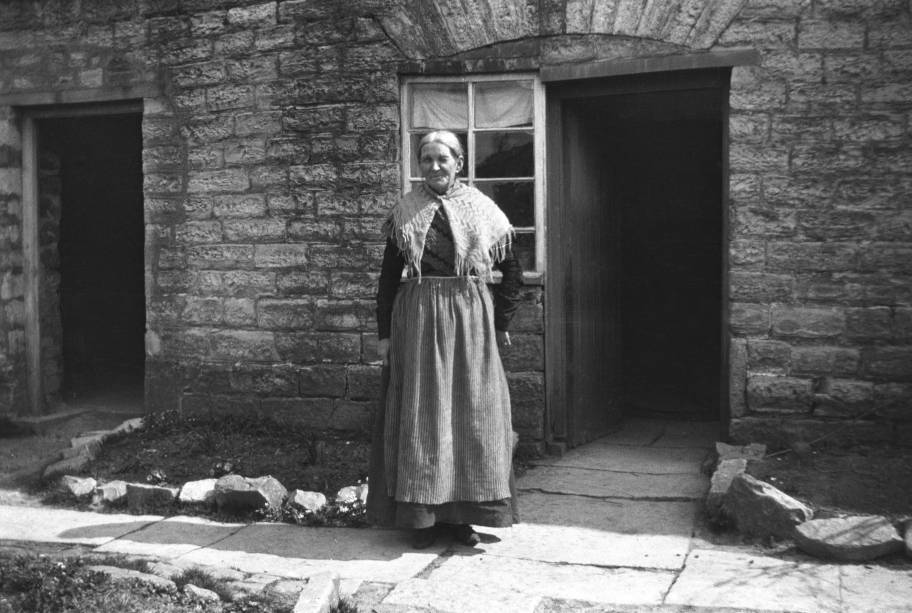An extract from Caroline Davison’s work in progress on how the true story of the brutal murder of a cabin-boy at sea was transformed into a musical evocation of rural Norfolk by one of England’s most renowned composers, Ralph Vaughan Williams.
All with my garling spikk I misused him
So shamefully I can’t deny
All with my marling-spike I gagged him
Because I could not bear his cry
‘The Captain’s Apprentice’ Verse 3
I am gazing into the eyes of Mrs Lucy White of Hambridge, Somerset, as she stands outside her cottage over one hundred years ago. She looks straight into the camera, amused, one corner of her pursed lips upturned. Her left arm is held awkwardly by her side, her elbow stiff. Behind her, the door is open, as though she and the photographer have just stepped outside to take the shot. There is no attempt at the picturesque, no formal backdrop – just Mrs White in her shawl and apron, grey hair tied back from her face. The photographer is Cecil Sharp, collector of folk songs.
Mrs White has sung several times for Sharp and Charles Marson, the local vicar; sometimes at the Parsonage, sometimes at home. Sharp notes down the tunes while Marson notes the words. The two men have become familiar to her and she feels certain that they are genuinely interested in her songs. At some point she gives them ‘Blow Away the Morning Dew’. The vicar’s hand falters momentarily as he writes down the lyrics. In the published edition it is noted that he found it necessary to ‘soften’ the words.[i]
First published in the early 17th century as ‘The Baffled Knight’, there are several alternative titles for the song Mrs White sang, but in all versions a man comes across a ‘pretty maid’ on her own in the countryside. Sometimes the man is a knight, sometimes he is a farmer’s son or a shepherd – perhaps a reflection of changing times and the region where it was sung. Whatever his rank, the man is filled with lust: in the 1609 lyrics he declares:
If I have not my will of you,
full soon fair lady I shall be dead.
Despite this, the woman persuades him that it would be more comfortable to go back to her house. When they arrive, she escapes inside from where she taunts him for his naivety. Verses from unexpurgated versions provide an idea of the words Mrs White might have sung:
‘Wait till you get to my father’s house,
Where you may lay me down, sir;
Where you can have my maidenhead
All on a bed of down, sir’.
‘And when you meet a pretty maid,
Little below the town, sir,
You must not mind her squalling,
Nor the rumpling of her gown, sir’[ii]
Sharp observes in the published collection that ‘the air is not an ancient one but it is eminently suited to the breezy character of the words.’
In the 1960s my father watched Farming Diary on television at Sunday lunchtimes while the beef joint finished roasting. Although I didn’t know it at the time, this was my earliest introduction to the music of Ralph Vaughan Williams: the theme tune was ‘Blow Away the Morning Dew’, taken from the third movement of his English Folk Songs Suite. In this orchestral arrangement of Mrs White’s tune, a jovial clarinet bobs along with a cheerful melody like the cooing of a collared dove, answered by other bird-like wind instruments, until they are gathered up by the brass and strings – as though the wind has blustered into a gale and thrown them into the sky. The music used to evoke for me queasy feelings of Sunday ennui, the flavour of gravy, and the stable order of things – the countryside looked after by men in Harris tweed hats, tractors ploughing the soil, white showers of seagulls rising and falling behind the big wheels. Now I am unsettled by the thought that while listening to the opening credits of Farming Diary, I was tapping my toe to the remnants of a Tudor song which encouraged men to take sexual advantage of women when given the chance or risk mockery.
Vaughan Williams was conscious of the awkward relationship between earthy lyrics and the beautiful airs that accompanied them – he never made public the titles of folk songs he had used for hymn tunes because, as he once wrote, ‘a lot of narrow minded people refuse to use the tune if they think it has Sexular (i.e. secular!!) associations.’[iii] He turned to folk songs for melodies not words. Out of this comes a disconnect between the sex, trickery, violence, and death of the songs and the distilled renditions found in orchestral pieces such as English Folk Songs Suite. In the same way that he transformed a song about attempted rape into a piece redolent of a heart-lifting bright day in the English countryside, Vaughan Williams captured the intensely tragic melody of ‘The Captain’s Apprentice’ and used it to conjure the melting dawn mist on a Norfolk marsh, haunted by the repetitive calling of lonely birds.
[i] Cecil Sharp & Charles Marson Folk Songs from Somerset pp.16-17 London: Simpkin Marshall, Schott & Co, Barnicott & Pearce 1905
[ii] Roy Palmer (ed) Bushes and Briars: Folk Songs collected by Ralph Vaughan Williams Llanerch Publishers 1999
[iii] Hugh Cobbe Letters of Ralph Vaughan Williams 1895-1958 Oxford: OUP 2010. In a letter to Simona Pakenham in 1958



